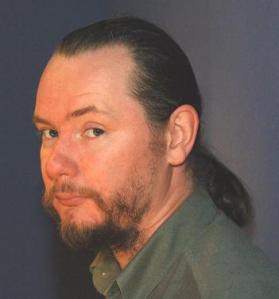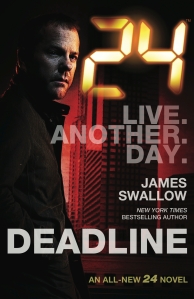The Intel: James Swallow
 This week’s Intel Interview is absolutely fascinating for anyone interested in the life of a commissioned writer. James Swallow is an author and script writer who has written a host of novels, short fiction, audio dramas and video games. He’s also the only British writer to have ever worked on the Star Trek TV series, providing story concepts for two episodes of Voyager.
This week’s Intel Interview is absolutely fascinating for anyone interested in the life of a commissioned writer. James Swallow is an author and script writer who has written a host of novels, short fiction, audio dramas and video games. He’s also the only British writer to have ever worked on the Star Trek TV series, providing story concepts for two episodes of Voyager.
As well as his own novels and stories - including The Sundowners steampunk western series - James has written a huge number of tie-in novels for movies, television series, comics and games, including Doctor Who, Star Trek, Judge Dredd, Stargate and Warhammer.
His latest novel, published by Titan Books, is 24: Live Another Day – Deadline. It fills in a missing part of the eventful and unhappy life of 24‘s rogue agent Jack Bauer.
James gives us the Intel on working with Jack, writing across different media and how ideas are the hard currency of any writer…
Tell us about 24: Live Another Day – Deadline. How does it differ from the events of the television series?
Deadline follows the 24 TV show model of a storyline told over 24 hours of real time, following Jack Bauer as he races across America from New York to Los Angeles in order to keep a promise to his daughter Kim, to see her one last time before he drops off the radar and vanishes – but Jack is being pursued by an investigation team led by a vengeful FBI agent and a strike force of Russian assassins, so he has a target on his back… And along the way, he stumbles on a dangerous situation in a small Midwestern town that he can’t walk away from.
In terms of how the book differs from the TV series, the key thing is that a novel allows you to show an internal viewpoint – you can get inside the heads of the characters in a way the television can seldom do.
As the events of the book pick-up where the show left off, how much freedom were you given to imagine what happens next to Jack Bauer?
Deadline is actually set before the events of 24: Live Another Day – specifically, one hour after the end of the previous season Day 8. There’s a four-year gap between the 8th and 9th seasons of the show, so that’s a lot more bad days that Jack can have!
In terms of freedom to tell stories, I was given a good degree of latitude to bring in elements from previous seasons and invent new events for Jack Bauer to be involved in. 24’s Writer-Producers Evan Katz and Manny Coto were consulted every step of the way to make sure the story in the novel connects directly to the TV show continuity.
 How have you recreated 24’s famous countdown sequences within the structure of the book?
How have you recreated 24’s famous countdown sequences within the structure of the book?
It would be almost impossible to replicate something like that in prose, as the ticking clock is such a striking bit of visual iconography – so instead I went for a story that takes place over a 24 hour period, told in 24 chapters, each with the same sense of fast-pace that the TV show exhibits.
You’ve written a lot of tie-in fiction for series such as Star Trek, Doctor Who and Stargate, as well as games and comics – how does the process of writing a tie-in differ to your own novels?
Working from a blank canvas can be very liberating but it can also be intimidating. Working in an established world can be fun, because you’re finding new ways to play with a toy box of ideas that are well-known, but it can also be quite restrictive. The key in both cases is to find what you love about the fictional world and tell the best story you can. I try to give both my original and tie-in work the same creative energy.
Are you often given a series ‘bible’ and other related material and strict parameters to work within?
Generally, the parameters are the elements of the franchise itself – the movies, TV episodes or games that form the fictional world you’re writing for. The source material is always the best resource to draw from, because it’s the origin from which all other stories spring.
You’re a writer who works on novels and short stories, as well as audio dramas and video games – how important is it that writers explore different media?
It’s not for everyone. Not all writers can shift gears and write in different formats – some are better suited to long-form stories, others to scripts, etc. But for me personally, I like moving between different media because it keeps me interested and it keeps my skills sharp. At the end of the day, it’s all writing, all words on the page and storytelling – but having to fit that narrative into different structures is a great challenge.
You’re an extraordinarily prolific writer – what’s your secret?
The secret is that there is no secret. I honestly don’t consider myself prolific, not when I look around and see other authors with sixty, seventy or more titles to their credit. I write because I love it and also because it pays my rent, but my secret to doing that is nothing more amazing than just sitting my backside in the chair and writing, day in and day out.
Take us through a typical writing day for you?
Up at 8.00am, in front of the computer by 9.00am. Check and answer emails, then editing of the previous day’s writing before stating the current day’s assignment. Try not to waste too much time on social media. Break for half-hour’s lunch between 1.00pm and 2.00pm. Write through until I hit my target word count for the day or until my wife comes home from work around 6.00pm, which ever comes first.
What’s the hardest lesson you ever had to learn about writing?
Don’t be precious with your ideas. Don’t treat them like gold and hoard them away. Ideas are the currency of the writing game, which means you have to spend them. And if you can’t generate more ideas at a moment’s notice, you’ll have a hard time being a writer of fiction.
How do you deal with feedback?
I find I get the best results when I use a flamethrower.
Who are the authors you admire, and why?
In thriller fiction, I’d have to say Robert Ludlum, Tom Clancy, Ian Fleming – all very different writers but they cast a long shadow over the genre, and have helped shape it to what it is. In science fiction, I enjoy the works of William Gibson, Philip K. Dick, Iain M. Banks – just for the sheer amount of creativity that goes into the worlds they write about.
Give me some advice about writing…
Two words: FINISH IT. All too often, people tell me they want to be writers, but they don’t have time or they have half a story they just can’t get around to completing. The fact is, if you can’t finish a story, you are not writer. You’re just playing at it. Even if you write and finish your thing and you hate it, the act of doing that has made you a better writer. It’s how you earn your experience, how you ‘level up’. No-one wants to read half a story, just like no-one wants a half-cooked meal.
What’s next for you?
I’ve just completed an original action thriller novel of my own, and I’m splitting my time between work on the script for to-be-announced videogame project and a science fiction tie-in based on the Star Trek franchise.

